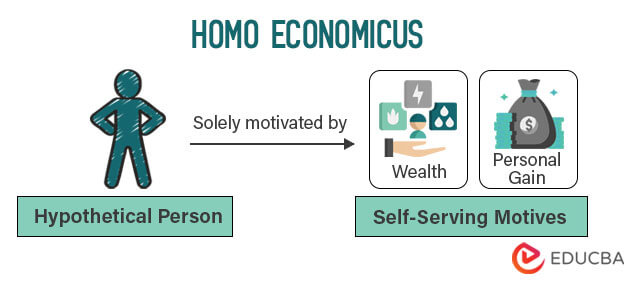Updated September 8, 2023
What is Homo Economicus?
Homo Economicus theory suggests that people are rational, self-interested, and care only about making money and gaining personal benefits. This means that individuals will only think about how they can profit and benefit themselves in any transaction.
For instance, a store owner might raise the price of a product to make more money, even if it means some customers cannot afford it.
However, emotions, social norms, and ethics can influence people’s decisions, leading to irrational behaviour that deviates from this concept.
Key Highlights
- In 1836, John Stuart wrote a political essay credited with originating the concept of Homo Economicus.
- It is the idea that humans pursue economic goals motivated by self-interest.
- This concept is based on three key assumptions in neoclassical economics: individuals maximize profits and utility, make rational choices, and act in self-interest.
- While the Homo Economicus model can be useful in explaining human behavior, it often overlooks other important factors such as emotions and biases.
How Does Homo Economicus Concept Work?
#1 Perfect Rationality
The Homo Economicus model assumes that people always make rational decisions based on complete information about their options. It means that they know what they want, how much they are willing to pay, and the value of each alternative.
#2 Self-Interested Motivation
Buyers or sellers always try to maximize their profit or utility which means they make choices that offer them the most significant benefit at the lowest possible cost. This concept also assumes that people’s self-interest is their primary motivator.
#3 Maximum Utility as a Buyer
This model suggests that an individual selects the most satisfying or beneficial option.
#4 Highest Profit as a Seller
This concept assumes that people always make the best decisions to maximize their profit when they are sellers.
Examples of Homo Economicus
Example #1
An investor named Sarah invests in a company that harms the environment and uses low labor costs because she believes it will make more money without considering the negative impact on society or others.
Example #2
Suppose an individual wants to buy a particular product costing $600 in one market and $800 in another. In that case, the Homo Economicus model suggests they will always make a rational decision by choosing to buy the product from the market where it costs $600 to save $200.
Advantages and Disadvantages
| Advantages | Disadvantages |
| This concept helps explain how people make decisions in markets. | Ignores that people can make decisions based on emotions, biases, or incomplete information. |
| It helps understand how people act in their self-interest. | Fails to account for non-monetary factors influencing decision-making, such as social norms and ethics. |
| It is useful in modeling economic behavior. | Homo economicus does not consider collective action or individual cooperation, leading to undesirable outcomes such as income inequality. |
| It provides a clear way to analyze how individuals allocate resources. | Simplifies human behavior by assuming that self-interest solely motivates individuals. |
Frequently Asked Questions (FAQs)
Q1. What is Homo Economicus?
Answer: Homo economicus is an economic term used to describe an individual who makes rational decisions based on their self-interest where individuals will choose the course of action that they believe will maximize their utility or benefit.
Q2. What is the relationship between Homo Economicus and Instrumental Rationality?
Answer: Homo Economicus is a theory that assumes people always act in their self-interest. Instrumental rationality is the idea that people use the most efficient means to achieve their goals, regardless of their goals. For instance, someone might choose a high-paying job instead of a job they love because it offers better financial rewards.
For instance, a software engineer might use a code library to quickly reuse pre-existing code for a new project; even if they prefer to write code from scratch, they will choose the most efficient option (the code library) to achieve their goal (completing the project quickly and efficiently) over their personal preference.
Q3. Is Homo Economicus a behavioural economics concept?
Answer: Homo economicus is not a concept in behavioural economics. Behavioural economics uses psychology and sociology to understand economic behaviour and challenges the assumptions of homo economicus, such as rationality and self-interest.
Q4. How does Homo Economicus differ from Adam Smith’s viewpoints?
Answer: Adam Smith, the father of modern economics, had a more nuanced view of human behavior than the simplified idea of Homo Economicus. In his book “The Theory of Moral Sentiments,” Smith argued that people are motivated by self-interest and a desire for empathy, morality, and justice. He recognized that social norms and institutions also play a role in shaping economic behavior.
Recommended Articles:
We hope this EDUCBA article on Homo Economicus was helpful to you. EDUCBA recommends the following articles for additional information on economics-related topics:


